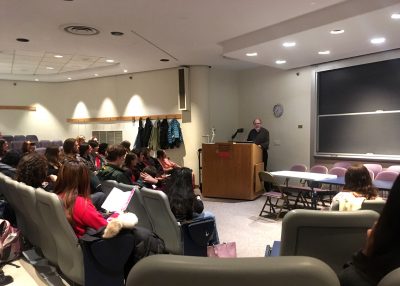
Students Against Hate Speech, a Boston University student group, hosted a town hall on Thursday where BU students expressed their grievances with the administration and called for the creation of an activist student union.
The event, titled “Why It Sucks To BU: A Townhall” and held in Sargent College of Health and Rehabilitation Sciences, was organized in response to conservative pundit Ben Shapiro’s Nov. 13 campus visit with the hopes of providing a platform for BU students to express their experiences with discrimination by the university, according to the event programming.
The event had 11 scheduled speakers that were mostly students but included an adjunct professor and local activist.
Speakers focused on Shapiro, who was invited to campus by BU group Young Americans for Freedom, but speakers also said they believe BU has issues of white supremacy, gentrification, ableism and its support of defense contractor Raytheon, among other topics.
Gladys Vargas, a sophomore in the College of General Studies, was the host of the event and she said she believes Shapiro’s visit reflects badly on BU.
“BU claims to be an institution of diversity, but has no problem [with students] inviting a bigot on campus and paying the security bill out of student’s tuition costs,” Vargas said. “This is one way in which BU reproduces white supremacy and other forms of bigotry on campus, a culture which permeates our campus and which minorities, poor students and workers feel on a day to day basis.”
Student speakers spoke of their individual experiences with discrimination, such as Anu Sawhney, a senior in the College of Arts and Sciences who said she has had to deal with ableism on campus.
“I think that the most overwhelming way in which BU enforces ableism is through what it prioritizes,” Sawhney said. “Up until last year, students had to go up and actually pick up hard copies of accomodations, which is really dumb if you’re a disabled student. Say you’re in a wheelchair and you have to actually go to the building, which is the entire reason you’re getting the accommodation.”
Chance Charley, a junior in CAS, also spoke to the crowd about how he sees systemic racism widespread throughout the university.
“Universities like BU have moved more and more to seek students who can pay exorbitantly expensive tuition costs rather than offer more financial aid to poor and working class students, black, Latino and white,” Charley said. “[Minority students] work themselves to exhaustion in an attempt to escape the notion that they are intellectually inferior — to escape the little comments about not being articulate, or questions about whether they really go here.”
Alice Pote, a senior software engineer at the Massachusetts Institute of Technology who attended the event, said that it’s important to have an organization like this on campus.
“I just think it’s really important that students are getting organized because as people were talking about there, there’s a lot of stuff going on on campus,” Pote said, “to have a way to work together and to, you know, fight for that.”
Joseph Guptill, a junior in the College of Communication, said he thinks there needs to be more student activism on campus.
“I mean agree with everything that’s been said,” Guptill said. “I feel like we need to reach out more to the student body because I feel like we just scratched the surface on the students who want to get involved on campus, because there’s a lot more inactivity happening — it seems just like sitting around and doing nothing and we need to get them motivated and out and loud and get the attention of the administration.”
John Wilkins, a sophomore in the College of Engineering, said he thinks the turnout for this event is a good sign for the university.
“I’m pleased with how many people turned up, I’m glad to see its a growing sign of the student movement,” Wilkins said. “I think it’s just the beginning of something that’s going to grow up to be quite a thing, hopefully, one can dream. I’m normally not an optimistic person, but this gives me a little bit of hope.”




















































































































Jane Wilson • Nov 8, 2019 at 11:09 am
Boston in general makes accessing accessibly difficult. Example: handicapped permit for cars only issued in Boston, and location not so easy to get to. Getting Ride service requires going to one facility for evaluation and waiting. Each of these is a wait after applying. The T? HA! Elevators are spaced far apart. Parking spaces in most lots not close to doors or elevators. Mass General does not have timely wheelchair services. Many buildings have restrooms that are in no way accessible. Just FYI.
Dave • Nov 8, 2019 at 6:17 am
I like this happening. You mention BU’s ties to Raytheon, how about our dining service Aramark.
They are in many of the correctional facilities across this country, you just google it and you’ll see the
atrocities they are committing, let’s talk about.